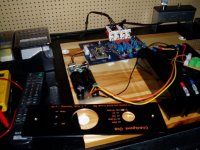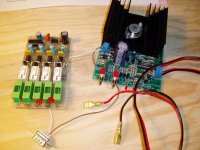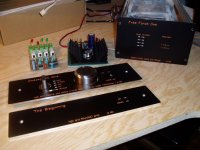battery power versus trditional power
I'd like to start a new thread on battery powering.
Advantages and disadvantages?
Has anybody here done some research?
I'm working on a project, where I will keep the cirquits heated by traditional power while I'm charging my batteries and then switch to batteries when playing. I plan to put batteries to my preamp, my active x-over and my RIAA-MC preamp.
Jørn
on the picture you see my current battery powered x-over (L C Audio - modified)
I'd like to start a new thread on battery powering.
Advantages and disadvantages?
Has anybody here done some research?
I'm working on a project, where I will keep the cirquits heated by traditional power while I'm charging my batteries and then switch to batteries when playing. I plan to put batteries to my preamp, my active x-over and my RIAA-MC preamp.
Jørn
on the picture you see my current battery powered x-over (L C Audio - modified)
Attachments
Sorry for double-posting......
"This thread died pretty quickly..."
Thought so myself, but maybe the discussion have been here long before I came in......... anyway, I could'nt find it!
"The battery part of the circuit design is straightforward"
Sure - my addition is, that I designed a kind of mutiplexer, so I can charge 4 x 12V batteries in series one by one using only one charger.
"but the question is, is it worth the additional complexity?"
I think so - the circuits will stay heated, and there will be no warm-up time - in my opinion this will give the best performance.
On the picture: left - slow multiplexer circuit - 15 minutes pr battery) / right - charger (Velleman kit)
Jørn
"This thread died pretty quickly..."
Thought so myself, but maybe the discussion have been here long before I came in......... anyway, I could'nt find it!
"The battery part of the circuit design is straightforward"
Sure - my addition is, that I designed a kind of mutiplexer, so I can charge 4 x 12V batteries in series one by one using only one charger.
"but the question is, is it worth the additional complexity?"
I think so - the circuits will stay heated, and there will be no warm-up time - in my opinion this will give the best performance.
On the picture: left - slow multiplexer circuit - 15 minutes pr battery) / right - charger (Velleman kit)
Jørn
Attachments
I was just thinking of float charging 3 batteries in parallel (if preamp is off), or place them in series if preamp is on. I'd use a supply splitter to derive a ground.medum said:...... my addition is, that I designed a kind of mutiplexer, so I can charge 4 x 12V batteries in series one by one using only one charger.
"but the question is, is it worth the additional complexity?"
I think so - the circuits will stay heated, and there will be no warm-up time - in my opinion this will give the best performance.
Charging power would be used for running control circuitry when the preamp is on.
But I wonder if it would sound that much better? Preamp will use OPA2134 or similar opamps.
paulb said:
........Charging power would be used for running control circuitry when the preamp is on.
But I wonder if it would sound that much better? Preamp will use OPA2134 or similar opamps.
I'm actually playing my cd-player through an old Noble pot into an electronic x-over. High Pass filter wth discrete components and low pass with LM6172 op-amps. I've tried without and with the battery supply.
Even my old ears tells me, that sound has improved quite much. My daughter - musician with very good ears - said "what happened - it's like if the scene has become much deeper"
So I can only say: Try it
I'll post the schematic for the "multiplexer" soon. Have to convert it to a readable format first.
by the way - very nice to hear from you out there!
Jørn
on the picture: frontpanels from Schaeffer Apparatebau, Berlin
Attachments
sreten said:JMO but with ............
Sorry sreten, I'm not sure what JMO means, I'm danish. Please spell that out for me.
Jørn
I honestly don't see any advantage of batteries at all. I can make a power supply with less than 3 millivolts of noise and ripple if it's required. Plus I get current limiting, remote sense capability, and very low source resistance that doesn't degrade over time. And modern opamps have 100 dB or more of PSRR at powerline frequencies. If you design your circuits such that power supply noise is an issue, that's poor design.
I will use +/- 9 volts occaisionally for utility projects where I want portability and an external power supply would be cumbersome. But designing batteries into a serious project I think is silly.
I will use +/- 9 volts occaisionally for utility projects where I want portability and an external power supply would be cumbersome. But designing batteries into a serious project I think is silly.
Thanks sreten!
You may be quite right. And maybe you're not. I'f I'm the only one to hear better performance using batteries, I'll bend to the dust.
I started this thread to learn and to hear your opinion. Thanks.
I really don't have a noise problem in my PS. That's not the issue. But honestly I hear better performance using batteries. Could there be other reasons?
maylar said:........... If you design your circuits such that power supply noise is an issue, that's poor design.
.........
...........But designing batteries into a serious project I think is silly.
You may be quite right. And maybe you're not. I'f I'm the only one to hear better performance using batteries, I'll bend to the dust.
I started this thread to learn and to hear your opinion. Thanks.
I really don't have a noise problem in my PS. That's not the issue. But honestly I hear better performance using batteries. Could there be other reasons?
I would have thought so too. But there is a lot more silly stuff going on around here than that. Check out the $1000 AC power cord market.maylar said:But designing batteries into a serious project I think is silly.
I just like the idea of total isolation of the preamp power supply from the AC power line. There's a lot of crap out there polluting the power lines, and I don't think you can ever get it all out.
If what you seek is not convenience but improved sound, batteries might provide substantial benefits. Mains supplies add a layer of grit and hash that detract from a unit's sound, and in a way, I suspect, not easily measurable. To give just one example, even with an absolutely clean mains supply, a typical bridge rectifier power supply will draw current in spikes with a power factor less than 0.7. Those spikey current draws will cause non-musical voltage fluctuations across resistances, a portion of which, given the non-perfect nature of voltage regulators and passive power supply devices, will find its way into amplification stages and finally the output. No wonder your daughter heard a sonic improvement with your battery supply.
A relevant question for you might be to what extent any given battery supply releases constant voltage and current. Batteries have internal resistance, and are not linear voltage and current sources. Some battery types are no doubt better than others. And perhaps inductive or other filtering might help? Be interested to hear your further experimentations!
A relevant question for you might be to what extent any given battery supply releases constant voltage and current. Batteries have internal resistance, and are not linear voltage and current sources. Some battery types are no doubt better than others. And perhaps inductive or other filtering might help? Be interested to hear your further experimentations!
serengetiplains said:.........A relevant question for you might be to what extent any given battery supply releases constant voltage and current. Batteries have internal resistance, and are not linear voltage and current sources. Some battery types are no doubt better than others. And perhaps inductive or other filtering might help? Be interested to hear your further experimentations!
For now Im reducing the 2x24 volts down to 2x15 by using 317/337 voltage regulators, and I'm bypassing my polarized capacitors with M-caps (330 nF) - maybe a bit wild.
As long as my Sealed Lead-acid Panasonic are higher than 12 V each, there is no audible sound-problems.
Jørn
ps - If anybody wants the schematic for my "mutiplexer" send me an email. I cant get the file under 100Kb without making it unreadable.
The only way grit and hash can detract from the amplifier's sound is if we let it get through the filters and regulators. There's no magic in electronics, just physics.serengetiplains said:If what you seek is not convenience but improved sound, batteries might provide substantial benefits. Mains supplies add a layer of grit and hash that detract from a unit's sound, and in a way, I suspect, not easily measurable....
For low-current, low-voltage circuitry I see big advantages to battery powered supplies. A bipolar +-12V, 1.2Ah supply and float charger can be constructed for around $30, which can be cheaper than a quality mains supply. (you only need a tiny 10VA transformer for the charger)
SLA gel cells also have extremely low series resistance. It is not as low as some active regulators, but it is achieved without feedback.
SLA supplies are also easier to "get right" than a mains supply. There are no issues with ground loops. And while 3mV may seem like a quiet supply, some discrete designs have very low PSRR and require a much quieter one than that!
I have not yet measured the noise on my SLA active crossover to the output of my LT1762 regulators on my DAC...that would be interesting I imagine. Those regs are spec'd for 20uV output noise.
SLA gel cells also have extremely low series resistance. It is not as low as some active regulators, but it is achieved without feedback.
SLA supplies are also easier to "get right" than a mains supply. There are no issues with ground loops. And while 3mV may seem like a quiet supply, some discrete designs have very low PSRR and require a much quieter one than that!
I have not yet measured the noise on my SLA active crossover to the output of my LT1762 regulators on my DAC...that would be interesting I imagine. Those regs are spec'd for 20uV output noise.
paulb said:............OK, I'm convinced. You, Dave?
I'm not sure about Dave, but I am!

by the way - here's the schematic for the "multiplexer" - shifting charger circuit:
Attachments
If what you seek is not convenience but improved sound, batteries might provide substantial benefits. Mains supplies add a layer of grit and hash that detract from a unit's sound, and in a way, I suspect, not easily measurable.
I've used sla's on and off in different power amps since -95 and I disagree, sla's are not free from "grit and hash" it is however different from the "grit and hash" you get from a basic mains supply.
Sla's or not you need ways of cleaning up your supply and the way to do it is similar in both cases, when done right I find it really hard to notice any difference.
Nobody here seems to have addressed the biggest advantage
of battery operation - the near total isolation from the AC line,
both in terms of the field of a power transformer located near
the circuit and the capacitive coupling (usually through the
transformer) to the AC line. This capacitance can allow quite a
bit of crap into the circuit
The former is addressed by moving the transformer away, but
it's tougher to get rid of the latter, which is substantial. With
batteries, this issue goes away.
of battery operation - the near total isolation from the AC line,
both in terms of the field of a power transformer located near
the circuit and the capacitive coupling (usually through the
transformer) to the AC line. This capacitance can allow quite a
bit of crap into the circuit
The former is addressed by moving the transformer away, but
it's tougher to get rid of the latter, which is substantial. With
batteries, this issue goes away.
- Status
- This old topic is closed. If you want to reopen this topic, contact a moderator using the "Report Post" button.
- Home
- Amplifiers
- Solid State
- battery power versus traditional power


